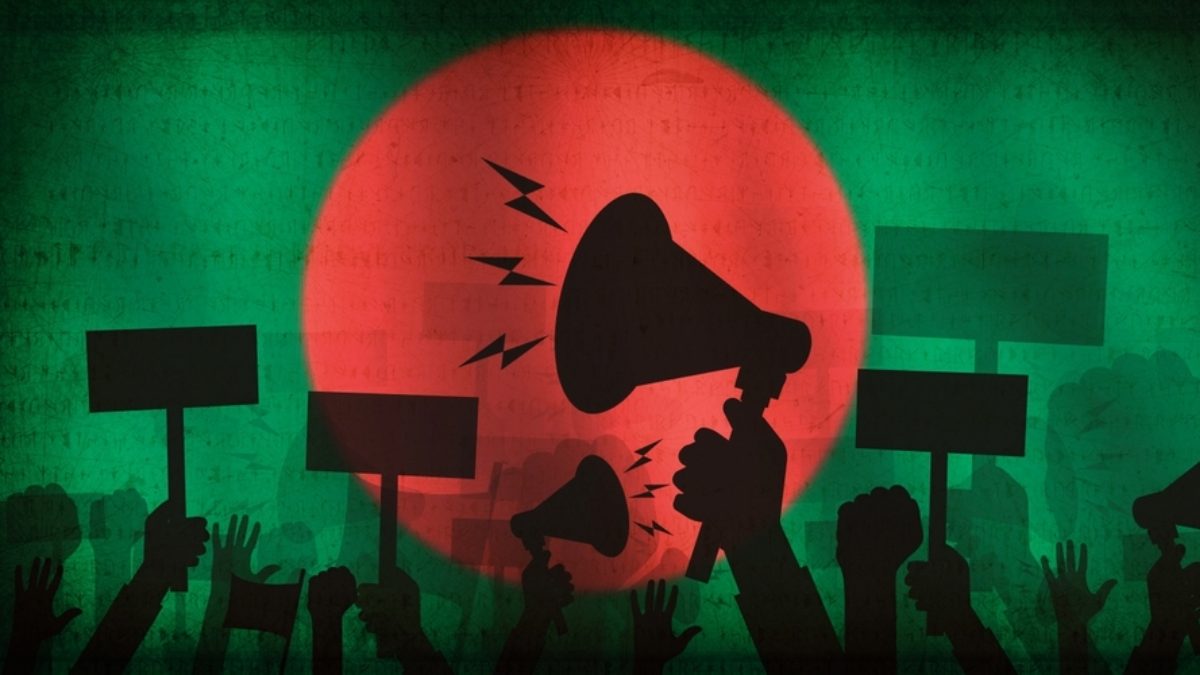From Social Media to the Streets: How Bangladesh’s Gen-Z Movement Overcame Internet Shutdowns to Overthrow an Autocrat
Samaya Anjum / Aug 12, 2024Bangladesh’s ousted Prime Minister Sheikh Hasina resigned and fled the country at around 3 PM local time on 5 August. The day before, coordinators of the Anti-Discrimination Student Movement had called for a “Long March to Dhaka,” inviting over 5 million people from around the country to the capital city to participate in the protests calling for Hasina’s resignation. Mobile internet had already been blocked for nearly 24 hours, and at around 10 AM on the day of the Long March, the nation descended to another near-total blackout as broadband internet became inaccessible.
At this stage of the movement, however, the message for people was clear. They had to convene “at Shahbagh at 2 PM.” It was word of mouth that spread the message as people began to head towards Shahbagh – a historic intersection which saw the beginning of some of the most significant student movements in Bangladesh’s recent history – and for people further away, the message was delivered by calls and SMS. “At Shahbagh at 2 PM,” they read. In the meantime, iron-wire barracks were laid on the roads around Gonobhaban, the Prime Minister’s residence, and on major highways around Dhaka to block the influx of people. But the moment the country’s military realized the utter number of protestors who had flocked to the capital city, they were compelled to facilitate Sheikh Hasina’s unceremonious exit.
This marked the unglorified fall of the Awami League regime led by Sheikh Hasina in Bangladesh, after enjoying four consecutive terms in power since 2009. During this period, the country witnessed several student protests on issues beginning from taxation to road safety and quota reform. However, none were successful in achieving a momentum as great as the recent movement, which initially began as a call to end long-standing discrimination in the government’s hiring practices. The Student’s Anti-Discrimination Movement (SAD) was organized and led almost entirely by the youth in Bangladesh, popularly referred to as generation Z, and they did so predominantly through online messaging and social media platforms.
Stories, Reposts, and a Renewed Sense of Urgency: Strategic Online Activism that Led to Grassroots Mobilization
The turning point of the anti-discrimination movement came when a thirty-second video of 25-year-old student protestor Abu Sayeed being shot went viral. A student of Begum Rokeya University in Rangpur, Bangladesh, Sayeed stood unarmed and with his arms stretched when he was shot four times in cold blood by two police officers. This happened on July 16, when the movement was still in its early days with only sporadic attention from the public. But soon after the video was shared on Facebook, millions responded, making it a decisive moment in the course and impact of the overall movement. What followed was an explosion of negative public sentiment towards the ruling party and a nationwide upsurge in student protestors. By July 18, the Awami League government ordered a complete shutdown of mobile and broadband internet, in addition to blocking access to Facebook, Instagram, and WhatsApp.
The government’s decision came in response to massive online campaigns that sparked in support of the anti-discrimination movement. People began to closely follow the Facebook accounts of SAD’s student coordinators through which they maintained public transparency on the progression and demands of the movement. On Instagram, this took the shape of a more organized front amongst the youth, who focused heavily on strategic communications such as creating spam-free broadcast channels for urgent news and alerts. Two such popular broadcast channels were “Defence against an unjust society” and “Quota Reform: Bangladesh Uprising” which consolidated important news from various sources and actively conveyed directions from student coordinators to help people organize themselves. Considering severe ongoing restrictions to internet access in Bangladesh, people benefitted from receiving essential updates from a single comprehensive source.
In reality, however, the broadcast channel “Quota Reform: Bangladesh Uprising” had no direct affiliations with the movement’s coordinators, and was led by the users behind what was formerly a meme account called “Bangladeshi Shitpostings.” The users took advantage of the account’s large follower base of more than thirty-four thousand – a majority of which comprises Bangladeshi Instagram users – to call to attention the events unfolding in the country. Several such meme accounts had also turned to advocacy, including “Eyes on Bangladesh” and “The Bangladeshi Voice.” The impact of the latter was so widespread that the creator, an anonymous Bangladeshi resident in the United Kingdom, was invited to speak with Al Jazeera about the protests.
Bangladesh’s youth also turned to other forms of creative online expressions, including cartoons and music, to convey their disapproval of the regime. Rap singer SHEZAN, who composed the song “Kotha Ko” (in English: Speak Out) which became widely known as the anthem of the anti-discrimination movement, was arrested and placed on remand by Hasina’s government. Despite the crackdown, people grew less cautious with what they were willing to say on social media – foreshadowing the impending fall of Sheikh Hasina, which, only a few weeks ago, would have seemed almost unfathomable. Public discourse on the movement then gradually began to shift, drawing comparisons between the anti-discrimination movement and the 1971 liberation war of Bangladesh. People now refer to the fall of the Awami League’s regime as Bangladesh’s “second independence.”
Connectivity Amidst Disconnect
Bangladesh endured one of its longest near-total Internet shutdowns when the Awami League-led government ordered a nationwide blackout on July 18. All forms of online communication were disrupted within the country, sealing it off from the outside world amidst large-scale protests and the government’s brutal crackdown. The total death toll between July 18 - 23 is yet to be established, but according to investigations by Bangladesh’s national daily Prothom Alo, more than 300 people were killed by the country’s security forces – among which 266 were students.
Disrupted access to 3G and 4G services around the country left people with only the option to communicate over phone calls and SMS. This came with its own sets of challenges, considering the Awami League government’s long-standing exercise of lawful interception and surveillance. Bangladesh was reportedly one of the 45 known countries to be affected by the notorious Pegasus spyware in 2021. There have been numerous reports about the country’s intelligence and law enforcement agencies procuring advanced interceptors, surveillance, and hacking tools for state-sponsored cyber-crimes over the last decade. Ahead of the general elections this year, the Awami League government also succeeded in launching a highly sophisticated system of integrated lawful interception (ILIS) which allows law enforcement agencies to tap into private communications, as well as gain access to the precise location and confidential information of a mobile phone user.
In the few weeks between July 18 and August 5, people I spoke to reported receiving a “call forwarded” message on their phones before their networks allowed their calls to pass through. Consequently, as the perceived risks involved in communicating over the phone increased, people were compelled to rely on codes for sharing any political or sensitive information, including for documentary and journalistic purposes. When the internet was restored on July 23 and in the days that followed, the media focused on awareness campaigns to prepare people for partial shutdowns. Bangladesh is a country of more than 171 million people, a majority of whom in poverty. The result of this is incredibly low digital literacy rates, which is why many of these awareness campaigns focused on basic online safety measures, such as the use of virtual private networks (VPN) to secure communications and circumvent censorship.
What's Next
In the end, it is believed that the anti-discrimination movement succeeded because of a greater desire for freedom, democracy, and hope among Bangladesh’s youth. As the country now attempts to transition, an interim government has been formed. The new Advisor for Information and Communications Technology (ICT) and one of the coordinators of SAD, Nahid Islam, has announced plans to investigate the nationwide internet blackout in July as his first order of business.
However, as the country emerges from nearly 15 years of autocracy, several major challenges face its information and communications technology (ICT) sector. These include infamous laws, such as the Cybersecurity Act 2023 (the successor to the draconian Digital Security Act 2018), the Data Protection Act 2023, and the Information and Communications Act 2006, which have stifled freedom of expression in the country for more than a decade. It remains to be seen how and if the interim government will choose to alter this regulatory regime, and what substantive reforms are brought to the ICT division of the former government before the country makes way for a new round of elections, which are crucial to restore democracy and achieve the ultimate goals of the movement.
Authors

